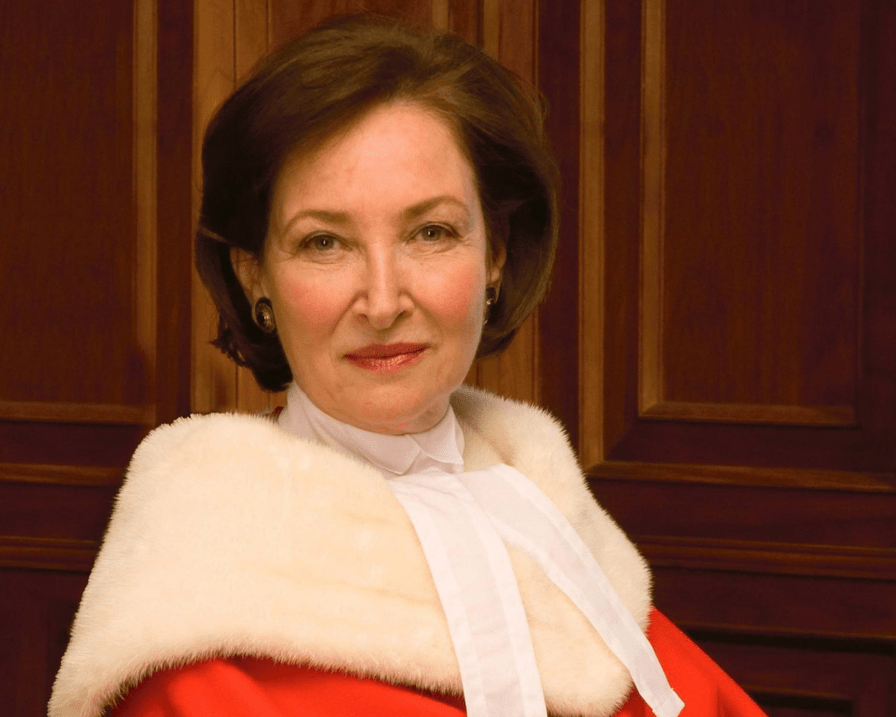Harvard Bound: Justice Abella’s Well-Earned Non-Retirement
The Supreme Court of Canada’s first Jewish woman, first refugee and longest-serving justice will retire on her birthday, July 1st.

L. Ian MacDonald
April 8, 2021
Rosalie Silberman Abella was born in a displaced persons camp in Stuttgart, Germany, 75 years ago on July 1, which turned out to be the national day of the country to which her parents, Jacob and Fanny Silberman, emigrated as refugees four years later, beginning a new life in Canada.
As Rosie Abella turns 75 and retires from the Supreme Court of Canada this coming Canada Day, she will begin a new role that same day as a Visiting Professor at Harvard Law School, the first ever Canadian appointed to a Chair at the most prestigious law faculty in America.
“Justice Abella is a brilliant, principled and impactful juror with a storied career in public service,” Harvard Law Dean John F. Manning said, announcing the appointment this week. One Harvard professor said Abella was “world-renowned for her decisions and theories on equality, human rights and constitutional law.”
As events would have it, her Harvard appointment was announced on the eve of Holocaust Remembrance Day.
Full circle. Entirely coincidental. But completely appropriate.
Rosie Abella’s family history has always been symbolically and substantively present in the story of her life.
Her father was a lawyer whom the Americans put in charge of the DP camp at war’s end. And when Eleanor Roosevelt visited camps across Europe in 1948, he introduced the former American First Lady to his fellow survivors at Stuttgart. Jacob Silberman explained that they represented “the remnants of European Jewry” who were homeless and impoverished. “The best we are able to produce are these few children,” he continued. “They alone are our fortune and our sole hope for the future.”
“I was one of those children,” Abella wrote recently in a riveting review in the current issue of Policy Magazine of David Michaelis’s Eleanor, his bestselling biography of Mrs. Roosevelt. Fanny Silberman saved her husband’s hand-written notes of that occasion, and many years later passed them on to their daughter.
The little girl in Stuttgart became a student at the Toronto Conservatory of Music; serious stuff. Later at University College, her contemporaries in the mid-60s included future Canadian leaders such as former NDP Ontario premier, and current UN ambassador, Bob Rae, and legendary Globe and Mail correspondent and commissioner of official languages, Graham Fraser, as well as the Lorne Michaels gang that went off to New York and started Saturday Night Live. In that company, Rosie later wrote to a friend that she was “the rehearsal pianist,” because she couldn’t act. In any event there was this graduate student named Irving Abella, six years older than herself, whom she married in 1968 at the age of 22 before finishing her law degree at University of Toronto in 1970. He would become a leading Canadian expert on the Holocaust in his own right as the co-author with Harold Troper of None is Too Many: Canada and the Jews of Europe, 1933-1948, the title infamously quoting an anonymous Canadian immigration officer.
In her own life, Rosie Abella has been a champion of the deprived and dispossessed, finding remedies in the law for Canadians lacking in rewards and recognition, and leading by the example of her own success.
Women, in particular, have been beneficiaries of her trailblazing accomplishments. When she was appointed to the Family Court of Ontario in 1976, she was the first woman on the court, and the first to be pregnant while sitting on the provincial bench. She was also the first Jewish woman judge in the country.
Later, she served as chair of the Ontario Labour Relations Board and on the Ontario Human Rights Commission before her appointment as head of a one-person federal Royal Commission on Equality in Employment. In her 1984 report, she created the term “employment equity” rather than styling it “affirmative action” as in the United States. But it was notable for its recommendations on women, Indigenous peoples, visible minorities and the disabled that were accepted by the SCOC in 1989 in a decision on the Charter of Rights and Freedoms. Abella was named to the Court of Appeal by Brian Mulroney in 1992 and to the Supreme Court by Paul Martin in 2004.
“She’s had a great life and highly significant achievements,” Mulroney said from his winter home in Palm Beach Thursday, after calling Abella to congratulate her on the Harvard appointment.
He’s known her since his government, only weeks in office in November 1984, received her employment equity report, “which we took very seriously—it was great work,” recalled Mulroney, himself a former labour lawyer. Within a year, his government adopted implementing legislation and by 1986 the Employment Equity Act was not merely a concept, it was the law of the land.
“I appointed her to the Court of Appeal, because I wanted to put her in contention for the Supreme Court, and Paul Martin later followed through,” said Mulroney.
At the Supreme Court for nearly two decades, she is now its longest-serving member. For most of that time, former SCC Chief Justice Beverley McLachlin was known as the leader, while Abella has been regarded as the writer—the author of highly readable, closely reasoned, persuasively conclusive opinions. Lawyers knew that winning both over usually meant winning the case.
And fundamentally, there’s the storyteller’s gift, as David Michaelis noted about her review of his book, shared with his publisher in New York by the Simon & Schuster team in Toronto. “I’m truly touched,” he wrote back to the S&S folks in Canada, “that Justice Abella ended with the ‘reveal’ of her own life’s story, so closely tied to Eleanor’s work in Germany after the war… ‘I was one of those children.’”
Michaelis concluded: “What an ending.”
But Abella’s story isn’t over. In her writer’s world, the best may be yet to come.
L. Ian MacDonald is Editor and Publisher of Policy Magazine.
